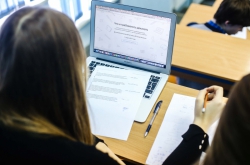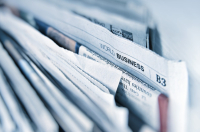Fakes are long-standing phenomena
The recent presidential elections in the USA stirred a whole wave of fake news. Though not substituted by any facts, this content was widely accepted in different parts of society. Opponents bombarded each other with fakes like the one with Pope Francis or pizzagate. Donald Trump's behavior after he became president is noteworthy, as well: for instance, his famous tweet where he accuses New York Times of their news being fake.
The problem of fake news is surely a pressing one. As of now, fake news has become an epidemy, and I'm afraid it will only get worse. Yet, we should remember that the problem itself is nothing new: fake news has a very long history that can be traced back to as early as 1802. There was an upsurge of this phenomena in 1939, just before World War II, and 30 years before that. So, if people have already faced this problem, why can't we fight it now?
Many see the possible solution in a wide discussion that will bring together the media, educational establishments, and citizens. They believe that the public has to bring up the issue of this crisis of confidence in the media's credibility that emerged as a reaction to the abundance of fake news. I support these ideas, yet I think that we have to focus on more pressing concerns and get to the root of the problem: why the upsurge of fake news even came to be, and how can one discern between fake news and real news?
 Donald Trump
Donald Trump
News is not some aggregate of undeniable facts
We often wonder how fake news is created, forget about the other issue - how they are consumed. Experts who analyze fake news often blame their authors but forget that the readers are partly responsible for spreading them as well.
The public has gotten used to seeing news as some aggregate of undeniable facts, unarguable presumptions. Let's say that despite the weather forecast being good, you'll get stuck somewhere in a storm. Surely, you'll get angry, but that won't make you stop relying on weather forecasts. By the way, when I left for St. Petersburg, I checked the weather forecast and it said that the weather will be great and I'll be feeling like I've come to San-Diego. Well, that wasn't exactly true. If the weather forecast warned you of a 29% probability of rain, would you leave your umbrella at home? Some would. Yet, I doubt you would've accused the weathermen of leaving the choice to you.
Believing the figures of authority is not enough
If you want to read news while adhering to the principles of critical thinking, just looking at the evidence and believing the figures of authority is not enough. You will also have to constantly ask yourself one question: what is credible and what isn’t? Instead of asking "whom should I trust", ask "how should I trust?".
 Thomas Leitch's lecture at ITMO UNiversity
Thomas Leitch's lecture at ITMO UNiversity
In this regard, news can be compared with Wikipedia, a resource the scientific community often underestimates as its content is edited by large amounts of people whose credibility is just impossible to assess, while traditional encyclopedias are written and edited by experts. A couple of years ago, I studied this issue in my book and came to the conclusion that though Wikipedia is not reliable enough, as my colleagues say, it nevertheless has a great effect on the educational process, competing even with such trusted titles as Encyclopaedia Britannica. Wikipedia makes one check the information and its sources. When the teachers encourage the students to doubt, they contribute to creating a new generation of thinkers and creators.
There can't be just two answers, as in I believe it or not
If you get your driving license, the theoretical knowledge you possess doesn't make you a good driver. Being a good driver implies the ability to adapt to the ever-changing conditions on the road. To a certain degree, you have to rely on your car, the quality of road pavement, and other drivers (as long as they’re following the rules). Yet adapting to the surroundings is the key.
Similar to that, the growing number of different phenomena brings forth new "types of trust", which is a lot more complex than just believing something or not. When writing a news item, the reporters let their source present their opinion on the subject. If anyone ever asked you to comment on something, did you ever ask yourself why these people want to hear my part of the story and make it public? Then, there are the issues of whom you can entrust your information to, what exactly will you say and so on.

Experienced readers learn to take account of such issues. Not only do they pay attention to the subject of a news item, but also account for whose viewpoint it is that they read, can these people be trusted, etc. Try as we may, news will never be simplified to just a list of facts, and that is something to remember.
When you are reading some news item, try asking yourself the following questions:
1) What is its main idea?
2) What evidence is provided to support it?
3) What arguments can I come up with to counter it?
4) Who are the concerned parties, and how many of them are represented in this news item?
5) Whose opinions were not represented and why?
6) What do the authors think I believe in, and what do they want to make me believe in?
7) How is this news item different from others?
8) How many other ways and sources I can find to learn more about the subject?
9) Whose interests does this news item try to protect?
10) What is the expected reaction to the information I've been provided with? What do I think about it?
What's more, when you try to make sense of a great number of different information sources, you'll inevitably face discrepancy. Several rules may help you cope with it. First of all, be rational: the less emotional you'll be, the clearer the picture will become. Look for the common grounds that can help you understand the situation better. Be inquisitive: think of circumstances in which the situation will no longer be "black-and-white". Lastly, go beyond the presented content and look for additional information that will allow to perceive the situation on a bigger scale.





